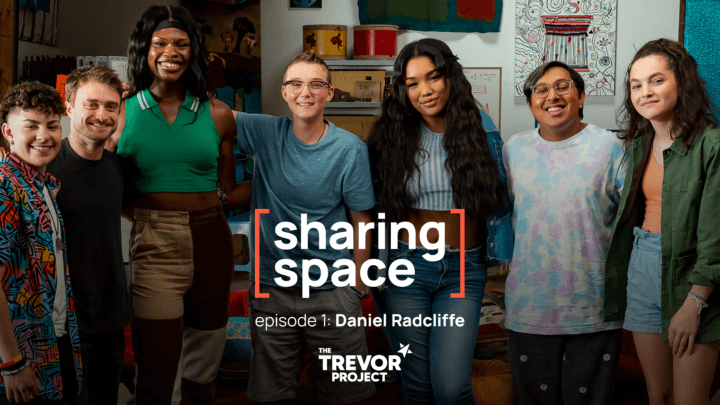Youth's Lives Every Day
- 85% of transgender and nonbinary youth say that recent debates around anti-trans bills have negatively impacted their mental health.
- For LGBTQ youth, racism is the “most important” issue impacting the world; more than 65% also say issues like anti-LGBTQ hate crimes, police brutality, gun violence, climate change, and efforts to restrict abortion access often give them stress and anxiety.
- Amid the ongoing COVID-19 pandemic, 63% of LGBTQ youth, including 71% of transgender and nonbinary youth, feel scared about the future.
January 10, 2022—The Trevor Project, the world’s largest suicide prevention and crisis intervention organization for lesbian, gay, bisexual, transgender, queer & questioning (LGBTQ) youth, released a new poll today that underscores the impacts of politics and current events on the mental health and well-being of LGBTQ young people. The poll was conducted by Morning Consult between September 14-November 5, 2021 among a national sample of 820 LGBTQ youth ages 13–24, including 318 transgender and nonbinary youth and 340 LGBTQ youth of color, 56% of whom are Black. The full polling data can be found here.
“These results underscore how recent politics and ongoing crises facing the globe can have a real, negative impact on LGBTQ young people, a group consistently found to be at significantly increased risk for depression, anxiety, and attempting suicide because of how they are mistreated and stigmatized in society,” said Amit Paley, CEO & Executive Director of The Trevor Project. “It’s clear that lawmakers should be taking an intersectional approach to public policy, not working overtime to target the most marginalized young people, particularly those who are transgender or nonbinary, for partisan political points. We all must play a role in promoting LGBTQ acceptance and creating a more supportive world for all young people.”
85% of transgender and nonbinary youth—and two-thirds of all LGBTQ youth (66%)—say recent debates about state laws restricting the rights of transgender people have negatively impacted their mental health. A record number of anti-transgender bills were introduced and passed across the country in 2021, and transgender and nonbinary youth are experiencing a range of negative emotions as a result:
- New policies that will ban transgender girls from playing on girls’ sports teams and transgender boys from playing on boys’ sports teams make 74% of transgender and nonbinary youth feel angry, 57% feel sad, 43% feel stressed, and nearly 1 in 3 feel scared.
- Proposed legislation that would ban doctors from prescribing gender-affirming medical care like puberty blockers or hormone replacement therapy to transgender and nonbinary youth make 73% of transgender and nonbinary youth feel angry, 57% feel sad, 47% feel stressed, 40% feel scared, and more than 1 in 3 feel hopeless, helpless, and/or nervous.
- Proposed legislation that would require schools to tell a student’s parent or guardian if they request to use a different name/pronoun or if they identify as LGBTQ at school make 56% of transgender and nonbinary youth feel angry, 47% feel nervous and/or scared, 45% feel stressed, and more than 1 in 3 feel sad.
When asked in an open response question—“what social issue impacting our country/world is the most important to you?”—most LGBTQ youth across race/ethnicity and gender identity stated racism, followed by LGBTQ rights/equality, climate change, and homophobia. Then when provided a list of issues to measure sources of stress and anxiety, a majority of LGBTQ youth said that anti-LGBTQ hate crimes (58%) and homophobia (56%) give them stress and anxiety “very often,” followed by not having enough money (50%) and racism (49%). Overall, more than 65% of LGBTQ youth also stated that police brutality, transphobia, gun violence, climate change, and efforts to restrict abortion access often give them stress and anxiety.
Additional key findings include:
- Amid the COVID-19 pandemic, LGBTQ youth reported high rates of feeling scared about the future (63%), having anxiety about in-person learning (46%), and feeling stressed (50%) and nervous (40%) about the 2021-2022 school year. Transgender and nonbinary youth disproportionately reported (53%) having difficulty getting mental health care compared to cisgender LGBQ youth (28%) and the overall sample (39%). More than 1 in 3 LGBTQ youth said they struggle to afford the things they need.
- Unprompted, most LGBTQ youth said that racism is the most important issue impacting the world. However, issue prioritization differed in intensity by race and gender identity. Black LGBTQ youth were significantly more likely to report racism as the most important issue to them while white LGBTQ youth were almost equally as likely to report racism as LGBTQ rights as the most important issue to them. Moreover, transgender and nonbinary youth were nearly four times more likely to cite transphobia as the most important issue to them.
- When provided with the list of issues, four in five transgender and nonbinary youth reported that anti-LGBTQ hate crimes, homophobia, transphobia, police brutality, and racism often give them stress or anxiety—a rate significantly higher than that of their cisgender peers. Black LGBTQ youth were disproportionately more likely to report that racism (16%), police brutality (15%), and gun violence (9%) cause them stress/anxiety “very often.” Conversely, white LGBTQ youth were more likely to report that transphobia (13%), anti-LGBTQ hate crimes (11%), and efforts to restrict abortion access (10%) cause them stress/anxiety “very often.”
If you or someone you know needs help or support, The Trevor Project’s trained crisis counselors are available 24/7 at 1-866-488-7386, via chat at TheTrevorProject.org/Get-Help, or by texting START to 678678.
About The Trevor Project
The Trevor Project is the world’s largest suicide prevention and crisis intervention organization for lesbian, gay, bisexual, transgender, queer & questioning (LGBTQ) young people. The Trevor Project offers a suite of 24/7 crisis intervention and suicide prevention programs, including TrevorLifeline, TrevorText, and TrevorChat as well as the world’s largest safe space social networking site for LGBTQ youth, TrevorSpace. Trevor also operates an education program with resources for youth-serving adults and organizations, an advocacy department fighting for pro-LGBTQ legislation and against anti-LGBTQ rhetoric/policy positions, and a research team to discover the most effective means to help young LGBTQ people in crisis and end suicide.
For media inquiries, please contact:
Rob Todaro
Senior Communications Manager
[email protected]
212-695-8650 x403


